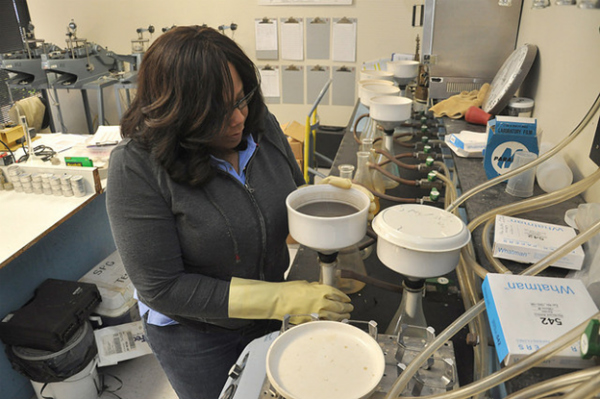
Material testing is the analysis of material characteristics and the operating performance of the raw material and the finished product. It is a well-established technique used to determine the physical and mechanical properties of the composite materials like cement, aggregate, steel, etc. used for construction purposes. In construction industry, material testing is performed for quality control and quality assurance of the products to be used.
1. Some Reasons Why Material Testing is Essential
- Estimates material stability
- Provides early detection of subsurface problems
- Saves the client from huge losses
- Minimizes delay and maximizes quality
- Helps in analyzing and creating construction design guidelines
Construction inspecting and monitoring is necessary and shouldn’t be an afterthought. Concrete is an integral part of building construction systems. Therefore, concrete testing is fundamental in assessing the structural stability of buildings, bridges, roadways and other infrastructures. A botched concrete test that missed the defects in the concrete could affect the building to be inhabitable and cause huge financial liabilities to contractors and material suppliers.
2. Materials and Products that Need to be Tested
Raw materials and finished products need construction inspection and monitoring to interpret whether the materials are safe or certified to be used for building construction. These materials and products need special inspection and monitoring to avoid major complications on site:
- Adhesives and Sealants
- Blocks
- Bricks
- Building Hardware
- Cement
- Ceramic
- Concrete, Grout, Mortar
- Construction material and geological samples
- Flooring materials
- Thermal Insulating products in buildings
- Lintels
- Masonry: Slate and Stone
- Pavers
- Pipes
- Rocks and Natural Stone
- Soil (all types)
- Tiles
3. Why Raw Material Testing is Required?
- To maintain the quality and consistency of the finished product.
- To avoid mistakes in the first stage of the manufacturing process.
- To obtain compliance certification by following construction guidelines and regulations.
- To ensure that the materials are suitable for production and usage.
- To determine the reason behind product failure during manufacture or while in use.
- To produce new materials and products for certification.
4. Material Testing in the Field and the Laboratory
MR Engineering provides the following tests:
(A) Field Tests for Soil and Asphalt
- Field density and moisture content in soil and asphalt is tested by a nuclear densometer
- Visual soil classification
- Pocket penetrometer test
- Drilling and disturbed sampling
- Standard Penetration Test (SPT)
- Cone Penetration Test (CPT)
- Field vane test
- Coring and core sampling
- Test pitting and block sampling
- Shelby tube sampling
- Sand cone test
- California Bearing Ratio (CBR)
(B) Laboratory Tests for Soil and Asphalt
- Moisture content test
- Organic content test
- Atterberg limit tests (plastic and liquid limit)
- Sieve analysis
- Hydrometer test
- Specific gravity
- Unified and AASHTO classification
- Soluble sulphate test
- Compaction tests (standard and modified Proctor)
- Consolidation test
- Swelling, shrinkage and collapsing potential tests
- California Bearing Ratio (CBR)
(C) Field Test for Concrete
- Air content of fresh concrete
- Slump of fresh concrete
- Density of fresh concrete
- Consistency of grout
- Concrete coring and core sampling
- Preparation and curing of cylindrical and beam samples for concrete
- Preparation and curing of cube mold for grout and mortar
- Concrete mix design and review
- Concrete Strength Non-destructive Test (NDT)
- Locate Concrete Rebar
- Construction inspection and monitoring
(D) Laboratory Test for Concrete
- Compressive strength of concrete cylinders (3″ by 6″, 4″ by 8″, and 6″ by 12″) and cubes
- Tensile strength of concrete cylinders
- Creep test
- Schmidt hammer test
- Density
Hire a professional who provides Quality Assurance (QA) and Quality Control (QC) services for concrete construction, earthworks, foundation inspection and monitoring, along with construction management. If you need your construction procedures and materials to comply with international design specifications and standards, contact the certified QA/QC inspectors and geotechnical engineers at MR Engineering.